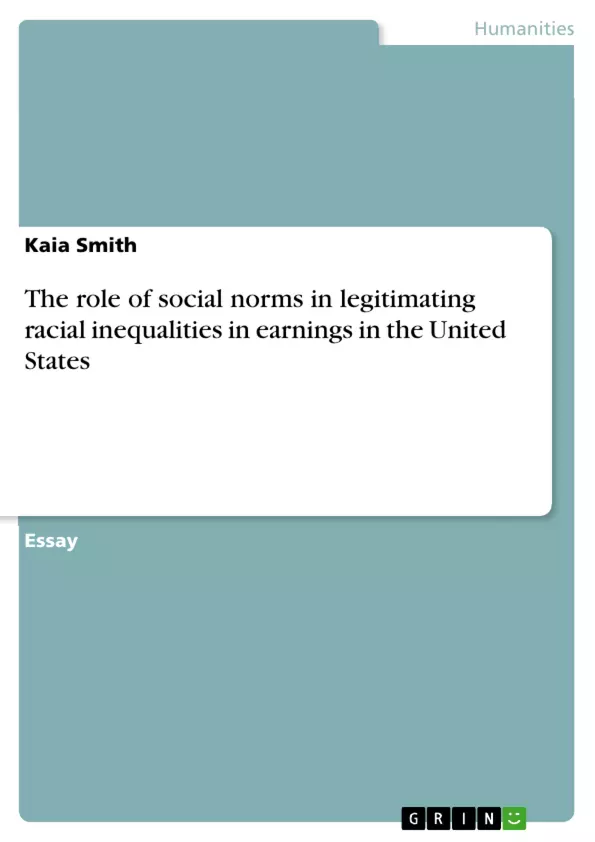Despite an increasing awareness of income inequality in the US, it continues to widen, in part due to lack of effective redistributive policy. These policies are largely shaped by public opinion, and so it seems necessary to look at underlying patterns of social beliefs and preferences. In the US in particular, wage inequality has been rising since the 1980s, and most Americans agree that the government should do something to reduce the gap. Despite widening income inequality, however, public support for redistribution has stagnated. I argue that alongside other material factors, social norms of racial exclusion and optimism about equal access to social mobility in the US have sown an environment in which public support for redistribution, as a remedy for income inequality, remains low. I then discuss feasible norm-centered policies to promote social justice and cohesion.
Inhaltsverzeichnis (Table of Contents)
- Introduction
- Theoretical & Empirical Foundations
- Norms, Public Opinion, & Policy in the US
- Policy Prescriptions
Zielsetzung und Themenschwerpunkte (Objectives and Key Themes)
This paper examines the role of social norms in perpetuating racial income inequality in the United States. It argues that, alongside other factors, norms of racial exclusion and optimism about equal social mobility have created an environment where public support for redistribution remains low. The paper also discusses policy prescriptions aimed at promoting social justice and cohesion by addressing these norms.
- The persistence of racial income inequality in the US despite increasing awareness and efforts to reduce it.
- The role of social norms, particularly those related to racial exclusion and optimism about social mobility, in shaping public opinion on redistribution.
- The impact of these norms on policy decisions and the limitations of existing policy frameworks in addressing racial inequality.
- The need for policy prescriptions that target and challenge these norms, promoting inclusive and equitable social practices.
- The importance of understanding the complex interplay between material factors, beliefs, and social norms in perpetuating inequality.
Zusammenfassung der Kapitel (Chapter Summaries)
- Introduction: The introduction sets the context for the paper, highlighting the persistent racial income gap in the United States and the importance of understanding the role of social norms in perpetuating this inequality. It argues for a focus on how these norms influence public opinion and ultimately impact policy decisions.
- Theoretical & Empirical Foundations: This chapter explores existing theoretical frameworks in the social sciences and critiques their shortcomings in fully explaining racial income inequality. It then introduces the concept of social norms and how they function, drawing on various theoretical perspectives. The chapter also discusses the impact of norms on policy decisions and how they can act as barriers to equality.
- Norms, Public Opinion, & Policy in the US: This chapter focuses on the specific context of the United States, examining how norms related to racial exclusion and optimism about social mobility influence public opinion on redistribution. It discusses the persistence of these norms despite legal changes and their role in perpetuating the racial income gap.
Schlüsselwörter (Keywords)
This paper focuses on the interplay between social norms, racial inequality, and income redistribution in the United States. It analyzes the impact of norms of racial exclusion and optimism about social mobility on public opinion and policy decisions. Key concepts explored include social norms, institutional racism, welfare policy, and the capability approach.
Frequently Asked Questions
Why does racial income inequality persist in the US?
It persists due to social norms of racial exclusion and a widespread optimism about social mobility that discourages support for redistribution.
How do social norms affect public opinion on redistribution?
Norms shape how people perceive fairness; if mobility is seen as "equal for all," many Americans believe government intervention is unnecessary.
What is the "optimism about social mobility" mentioned in the text?
It is the belief that anyone can succeed through hard work, which often masks the systemic barriers faced by racial minorities.
What are "norm-centered policies"?
These are policies designed to challenge and change exclusionary social beliefs to promote social justice and cohesion.
What is the role of institutional racism in this context?
Institutional racism is reinforced by social norms, creating barriers in the labor market that lead to significant earnings gaps.
- Quote paper
- Kaia Smith (Author), 2017, The role of social norms in legitimating racial inequalities in earnings in the United States, Munich, GRIN Verlag, https://www.grin.com/document/387311



